Interconnection, Consumption and Climate Optimism
Part 1 – Lessons From The Ethiopian Highlands
When I was asked to do the Greenhouse Culture takeover, I delightedly said yes! I’m excited to join so many interesting artists, activists and visionaries. I have lots to share but instead of bombarding the page with too much information, I decided to whittle it down to the things I considered the most important.
I will be sharing my personal journey, my inspirations and musings.
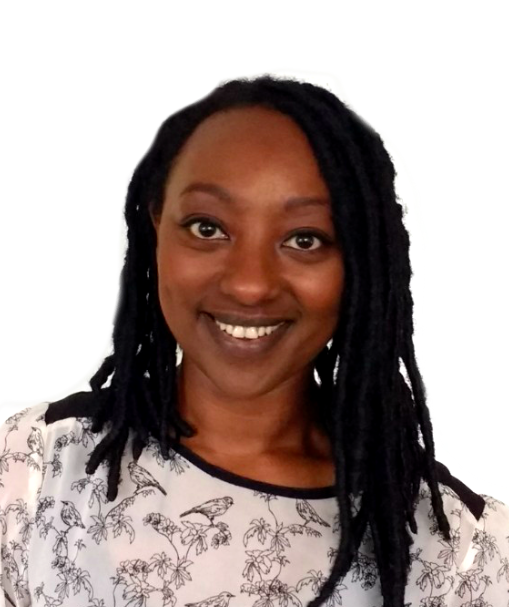
I’m Elsa, I’m a small business owner and studied International Development in Maynooth. I’m Irish Ethiopian and despite being adopted from Ethiopia in the 1980’s by my parents who were aid workers there, I was raised in Ireland and I identify myself as much Irish as I am Ethiopian. The reason I’m sharing my Ethiopian heritage is to give a little context to my inspirations when it comes to my love of the environment and my personal belief that people everywhere need to be included in the conversation, when it comes to Climate Justice.
Just before my 9th Birthday my parents took a two year job in Ethiopia, partly to reconnect me with Ethiopia, partly because of their own love of the country but mostly because they both loved what they did.
I had met lots of Ethiopians in Ireland but my knowledge of the country was limited to them, the food and the fact that I had been born there. I was extremely excited about the trip but wasn’t sure what to expect. Up to that point,I had been your average cartoon watching 8 year old, obsessed with chocolates and sweets, which I later found was a drastic difference to the life I would find myself living.
Ethiopia was a dream and at times a nightmare for a wide-eyed 9 year old Dubliner! It was an education on life, and I will forever cherish the lessons I learned during my two years living there.
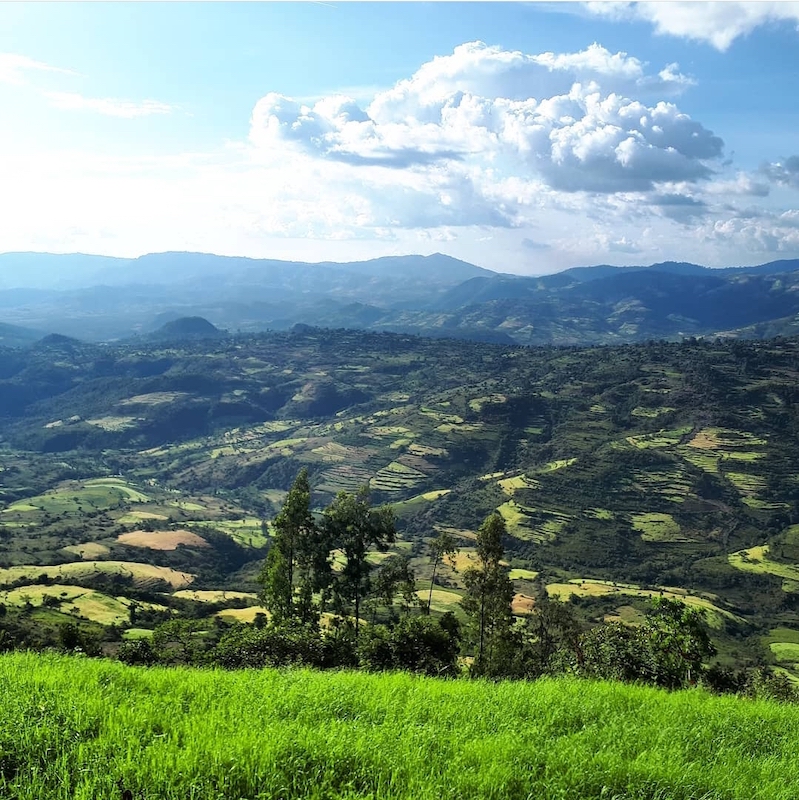
My Mother ran a womens development project, supporting single women in developing their skills and creating avenues for them to make an income. Each week I was inspired by her work. I would travel with her to the small village where her project was, meeting the incredible women she worked with. My father worked on irrigation projects and dam building, supporting local farmers to access the water they needed to grow their crops.
My Biggest inspirations for my passion around climate, equality and justice come from each of my parents and my time in Ethiopia.
My Mother taught me about the importance of fair wages, how incredibly skilled and talented people can find their work devalued, with no access to markets that would pay them fairly and the importance of community support.
My Father inspired my love for nature. He taught me to respect nature, to leave no trace behind, and how vulnerable people are to weather events, especially in places like Ethiopia. Our family sunday afternoon hikes into the highlands of Ethiopia were always full of birdwatching, plant examining and many times running frantically away from a giant unknown flying insect!
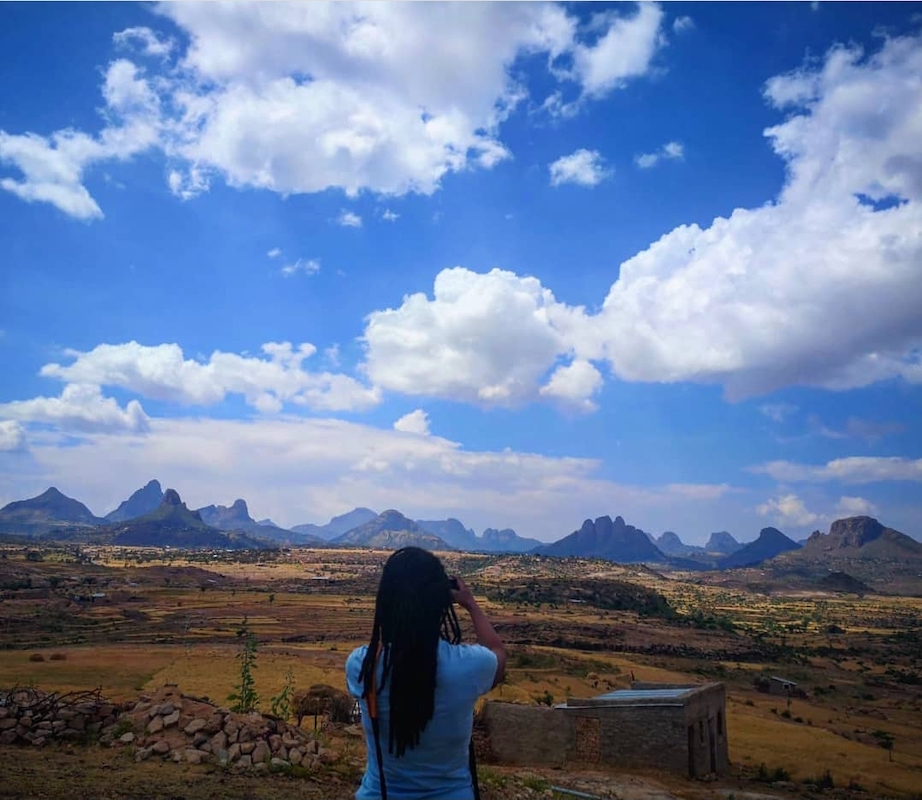
When I first arrived, the thing that shocked me was the poverty, something that hit like a slap in the face. I suddenly became acutely aware of the meaning of privilege, at the same time, the kindness I experienced in Ethiopia was like nothing I ever experienced before. People were genuinely concerned with the wellbeing of each other, they shared what they had. Neighbours raised and fed each others children, the elderly were respected and those that were parents were looked after by and lived with their adult children. I remember many times being invited to the homes of some of the people my Mother worked with and the generosity they showed us was something I had never experienced, feeding us and ensuring we were comfortable even when they really didn’t have a lot themselves.
In our second year the local farmers tackled an infestation of superworm, that ate through their crops at a shocking rate. Many resorted to beating them with sticks, while those that could afford it were out spraying them. Later swarms of locusts arrived causing another bout of action from the farmers. Shortly after the locusts had been dealt with as best they could, a sudden shower of giant hailstones ( I kid you not, the size of Ice cubes) flattened more of their crops. It was heartbreaking to watch these people who had worked so hard scrambling to salvage the last of their crops, knowing that they would not have enough to make it through to next year in a country with no security nets to lean on.
Finding myself back in Ireland after two incredibly enriching years was tough. In Ireland, the sheer volume of advertisements, marketing, and the encouragement of consumerism felt like a slap in he face compared to Ethiopia where beauty standards, advertising, consumerism and marketing all took the back burner. I never felt inadequate because of the things I didn’t own, or the way I looked in Ethiopia.
These life experiences have mapped out a life of meaning for me. They taught me to work towards equalising the playing field for people while respecting and loving the natural world and later, they lead me to a BA in International Development where I studied development theories, Aid models, Sustainability, Climate Justics, Project Managment, Media as well as Politics, and Corporate Social Responsibility.
“Life is a Trip, Travelling is Living Twice”
– Omar Khayyam
Part 2 – Capitalism and Optimism
As climate change increasingly got media attention and as consumers started pushing for greener alternatives, I became acutely aware of the sudden spike in companies greenwashing themselves. I saw this both when it comes to the environment, as well as fairly paying the people who make their products or pick their raw materials. This all led me to set up Oh My Good in late 2021. An online sustainable and fair trade marketplace working to change how business is done by carefully choosing each product to maximise its global and local benefits.
I do not believe that the responsibility or onus of examining your environmental impact should sit solely on the shoulders of citizens and consumers. Many reasons have led me to this conclusion, but one that stands out is that back in 2004 BP, one of the world’s biggest polluters unveiled its carbon footprint calculator. This was a calculator that seemed innocent enough. You could simply record your lifestyle choices and find out what impact you had on the environment. However, the fact that a company with a huge carbon footprint was asking “Joe Bloggs” who lives a modest lifestyle in comparison to think about his own impact on the environment blew my mind. This is how big oil blamed us for their greed, a perfect example of greenwashing and sadly their tactic worked. As a society, we continue to preach to individuals about their impacts while ignoring the looming elephants in the room. The phrase carbon footprint is still unfortunately used everywhere, a testament to their success.
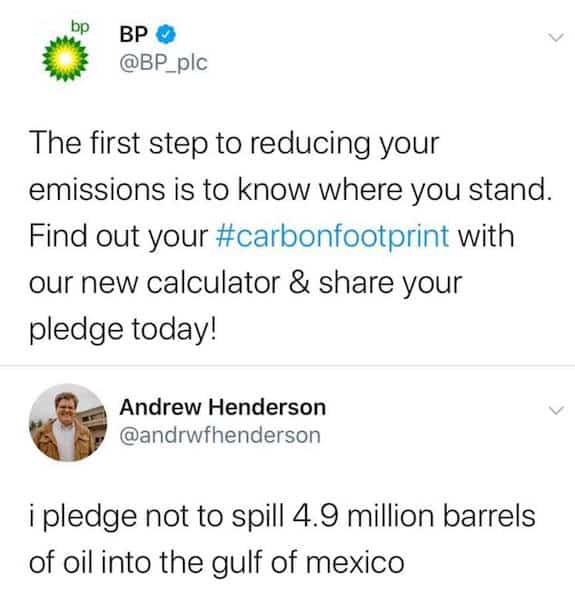
We live in a society that has, for decades encouraged mass consumption. With companies chasing profits at all costs, we see workers and the environment used as a tool for making profits. When 71% of the world’s carbon emissions are linked to 100 companies and with those in developing countries feeling climate change the most, we need to reevaluate where the blame should land and avoid playing into the hands of BP and others.
The good news is that we have immense power as consumers. Each thing we buy is a vote for the type of business we want in existence and ultimately it creates the type of world we want in future. While I’m always critical of capitalism this is actually one of the greatest things about living in a system that values profits above all else. Simply by spending our money we can really determine how businesses operate. The fact of the matter is that if businesses weren’t affected by consumers’ spending habits we wouldn’t see such a rise in greenwashing. We can make lasting changes by calling out these companies, holding them accountable, and spending our money on positive businesses.
Yes most of us know by now that individual actions still matter, but to many, it feels like the world continues to head towards long-lasting climate change. With eco-anxiety on the rise, how can we find positivity in this?
Climate optimism is our best hope. After all, there are a lot of positive things we could be focusing on. Optimism breaks through the feelings of overwhelm and inaction to foster hope, connection and change. Changing our perspective allows us the room to see the light at the end of a dark tunnel lined with negative news and disheartening reports.
When I speak about eco-anxiety, I’m speaking from my own experiences. As a child whose parents were always vocal about climate change and who attended climate protests from a young age, I had to understand the emotions I found myself feeling around the topic. I had to find perspectives that kept my mind at ease. From my experiences, eco-anxiety has roots in many different feelings and emotions. Anger at how the world has been treated and the disregard for nature, resentment at corporations who continue to exploit our future, hopelessness around whether there is really anything we can do, and overwhelm at the mountain of change that is needed to make strides. The good news is that amid everything eco-anxiety is simply a matter of perspective and perspectives can ALWAYS be changed. It takes some work but it’s worth it.
“Never doubt that a small group of thoughtful, committed citizens can change the world;
– Margaret Mead
indeed, it is the only thing that ever has”
There are 4 areas that have helped me realise the immense power we all have to shape our world.
- Understanding that small changes really do make a difference. Small actions repeated regularly and repeated by many, can be one of the most powerful things we can do.
- Our money is our vote. In a world that revolves heavily around profits, money is key to changing the status quo. Where we spend our money and the businesses we support are votes for our future.
- Learning how to recognise when greenwashing is happening to us allows us to make the best choices when it comes to casting our money vote. It allows us to hold companies to account for misleading us and it arms us with information that helps us make the best choices for ourselves, our loved ones, the planet and the people who make the products we buy.
- You don’t have to be perfect, none of us are. We all have habits that are harder than others to break. Make it fun, enjoy the journey, and never beat yourself up for not being sustainable or green enough. In order for us to be kind to the planet, we need to be kind to ourselves and to each other.
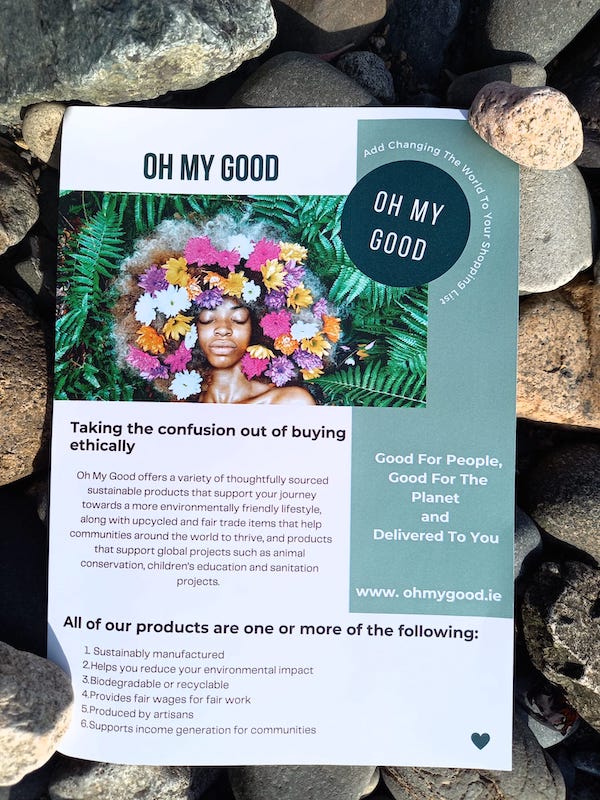
As a business owner, I wanted Oh My Good to challenge how business is done and nurture climate optimism in our customers. Oh My Good is not about chasing profits but creating a new way of doing business, by focusing on what I believe are ultimately structural changes. We’re not here to lecture anyone or stress them out for not doing enough. It’s important to me that my customers know, that while yes, there is a need for us all to take individual actions, we are all on a journey with different strengths. No one is perfect and it helps no one to feel bad about themselves for not doing more. We all have good and bad days, and we have things that are easier to change than others, but what I do encourage is small steps, a positive outlook and the knowledge that change really can happen. With articles that nurture optimism and new perspectives, we aim to use capitalism to change capitalism and empower consumers.
If you are interested in learning more about how to identify greenwashing, Oh My Good has developed a free greenwashing guide (Irish Edition) to help consumers spot when a company isn’t quite being honest with them: https://ohmygood.ie/pages/guide-to-spotting-greenwashing
Part 3 – a (powem) poem: Be Powerful
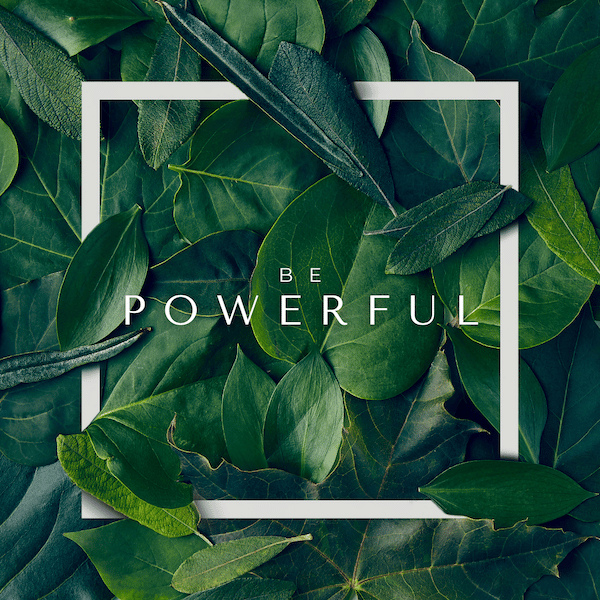
Be Powerful
Protect the earth at every cost
from summer sun to winters frost,
the seasons slowly bending, breaking
new seasons climate change is making.
They tell us ignorance is bliss
but bliss can quickly go amiss,
so we need to find power in knowledge
for us to get the best advantage.
News articles both big and small
tell us that we’ll lose it all,
they make us feel like we are helpless
while companies still act reckless.
but if we change our point of view,
we can see it all anew,
We are powerful on this journey
like an earth protecting army.
Our money counts our voices boom,
with every purchase, we’re in the room,
our future doesn’t look so bleak
when we have a voice to speak.
Power is not sum zero
which means that we can all be heroes,
when they have power, we can too,
We just have a different view
If we want to make the change
we need to turn over the page,
and see ourselves as powerful beings
not helpless viewers just disagreeing.
We’re shaping life
with our vision,
a world that’s based
on our decisions.
Elsa is the founder of Oh My Good, an online marketplace offering a variety of thoughtfully sourced sustainable products along with upcycled and fair trade items that help communities around the world. In her childhood, Elsa lived in rural Ethiopia where she discovered her passion for the environment and social justice. She later went on to study International Development at Maynooth University. With 10 years of experience working in the not-for-profit sector, in 2021 amidst the global pandemic, she followed her passion and set up Oh My Good.
Elsa is currently running a greenwashing campaign with a free guide to spotting greenwashing (Irish edition). Get a copy of this Free Greenwashing Guide